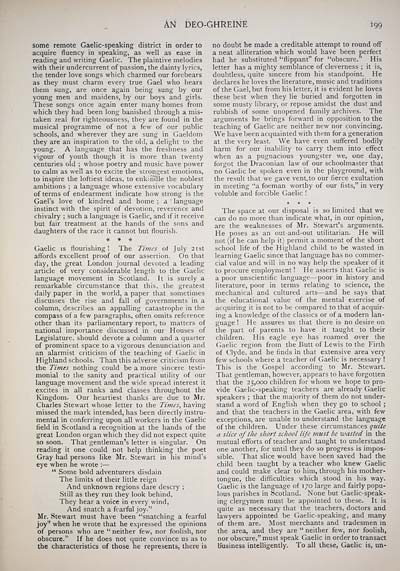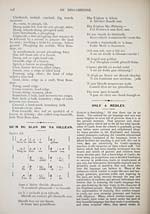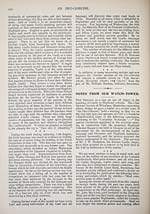Blair Collection > Deo-gréine
(221)
Download files
Complete book:
Individual page:
Thumbnail gallery: Grid view | List view

AN DEO-GHREINE
199
some remote Gaelic-speaking district in order to
acquire fluency in speaking, as well as ease in
reading and writing Gaelic. The plaintive melodies
with their undercurrent of passion, the dainty lyrics,
the tender love songs which charmed our forebears
as they must charm every true Gael who hears
them sung, are once again being sung by our
young men and maidens, by our boys and girls.
These songs once again enter many homes from
which they had been long banished through a mis-
taken zeal for righteousness, they are found in the
musical programme of not a few of our public
schools, and wherever they are sung in Gaeldom
they are an inspiration to the old, a delight to the
young. A language that has the freshness and
vigour of youth though it is more than twenty
centuries old ; whose poetry and music have power
to calm as well as to excite the strongest emotions,
to inspire the loftiest ideas, to enkihclle the noblest
ambitions ; a language whose extensive vocabulary
of terms of endearment indicate how strong is the
Gael's love of kindred and home ; a ' language
instinct with the spirit of devotion, reverence and
chivalry ; such a language is Gaelic, and if it receive
but fair treatment at the hands of the sons and
daughters of the race it cannot but flourish.
* * -it-
Gaelic is flourishing! The Times of July 21st
affords excellent proof of our assertion. On that
day, the great London journal devoted a leading
article of very considerable length to the Gaelic
language movement in Scotland. It is surely a
remarkable circumstance that this, the greatest
daily paper in the world, a paper that sometimes
discusses the rise and fall of governments in a
column, describes an appalling catastrophe in the
compass of a few paragraphs, often omits reference
other than its parliamentary report, to matters of
national importance discussed in our Houses of
Legislature, should devote a column and a quarter
of prominent space to a vigorous denunciation and
an alarmist criticism of the teaching of Gaelic in
Highland schools. Than this adverse criticism from
the Times nothing could be a more sincere testi-
monial to the sanity and practical utility of our
language movement and the wide spread interest it
excites in all ranks and classes throughout the
Kingdom. Our heartiest thanks are due to Mr.
Charles Stewart whose letter to the Times, having
missed the mark intended, has been directly instru-
mental in conferring upon all workers in the Gaelic
field in Scotland a recognition at the hands of the
great London organ which they did not expect quite
so soon. That gentleman's letter is singular. On
reading it one could not help thinking the poet
Gray had persons like Mr. Stewart in his mind's
eye when he wrote : —
" Some bold adventurers disdain
The limits of their little reign
And unknown regions dare descry ;
Still as they run they look behind,
They hear a voice in every wind,
And snatch a fearful joy."
Mr. Stewart must have been "snatching a fearful
joy" when he wrote that he expressed the opinions
of persons who are " neither few, nor foolish, nor
obscure." If he does not quite convince us as to
the characteristics of those he represents, there is
no doubt he made a creditable attempt to round off
a neat alliteration which would have been perfect
had he substituted "flippant" for "obscure." His
letter has a mighty semblance of cleverness ; it is,
doubtless, quite sincere from his standpoint. He
declares he loves the literature, music and traditions
of the Gael, but from his letter, it is evident he loves
these best when they lie buried and forgotten in
some musty library, or repose amidst the dust and
rubbish of some unopened family archives. The
arguments he brings forward in opposition to the
teaching of Gaelic are neither new nor convincing.
We have been acquainted with them for a generation
at the very least. We have even suffered bodily
harm for our inability to carry them into effect
when as a pugnacious youngster we, one day,
forgot the Draconian law of our schoolmaster that
no Gaelic be spoken even in the playground, with
the result that we gave vent.to our fierce exultation
in meeting ''a foeman worthy of our fists," in very
voluble and forcible Gaelic !
The space at our disposal is so limited that we
can do no more than indicate what, in our opinion,
are the weaknesses of Mr. Stewart's arguments.
He poses as an out-and-out utilitarian. He will
not (if he can help it) permit a moment of the short
school life of the Highland child to be wasted in
learning Gaelic since that language has no commer-
cial value and will in no way help the speaker of it
to procure employment ! He asserts that Gaelic is
a poor unscientific language — poor in history and
literature, poor in terms relating to science, the
mechanical and cultured arts — and he says that
the educational value of the mental exercise of
acquiring it is not to be compared to that of acquir-
ing a knowledge of the classics or of a modern lan-
guage 1 He assures us that there is no desire on
the part of parents to have it taught to their
children. His eagle eye has roamed over the
Gaelic region from the Butt of Lewis to the Firth
of Clyde, and he finds in that extensive area very
few schools where a teacher of Gaelic is necessary !
This is the Gospel according to Mr. Stewart.
That gentleman, however, appears to have forgotten
that the 25,000 children for whom we hope to pro-
vide Gaelic-speaking teachers are already Gaelic
speakers ; that the majority of them do not under-
stand a word of English when they go to school ;
and that the teachers in the Gaelic area, with few
exceptions, are unable to understand the language
of the children. Under these circumstances quite
a slice of the short school life must be wasted in the
mutual efforts of teacher and taught to understand
one another, for until they do so progress is impos-
sible. That slice would have been saved had the
child been taught by a teacher who knew Gaelic
and could make clear to him, through his mother-
tongue, the difficulties which stood in his way.
Gaelic is the language of 170 large and fairly popu-
lous parishes in Scotland. None but Gaelic-speak-
ing clergymen must be appointed to these. It is
quite as necessary that the teachers, doctors and
lawyers appointed be Gaelic-speaking, and many
of them are. Most merchants and tradesmen in
the area, and they are " neither few, nor foolish,
nor obscure," must speak Gaelic in order to transact
business intelligently. To all these, Gaelic is, un-
199
some remote Gaelic-speaking district in order to
acquire fluency in speaking, as well as ease in
reading and writing Gaelic. The plaintive melodies
with their undercurrent of passion, the dainty lyrics,
the tender love songs which charmed our forebears
as they must charm every true Gael who hears
them sung, are once again being sung by our
young men and maidens, by our boys and girls.
These songs once again enter many homes from
which they had been long banished through a mis-
taken zeal for righteousness, they are found in the
musical programme of not a few of our public
schools, and wherever they are sung in Gaeldom
they are an inspiration to the old, a delight to the
young. A language that has the freshness and
vigour of youth though it is more than twenty
centuries old ; whose poetry and music have power
to calm as well as to excite the strongest emotions,
to inspire the loftiest ideas, to enkihclle the noblest
ambitions ; a language whose extensive vocabulary
of terms of endearment indicate how strong is the
Gael's love of kindred and home ; a ' language
instinct with the spirit of devotion, reverence and
chivalry ; such a language is Gaelic, and if it receive
but fair treatment at the hands of the sons and
daughters of the race it cannot but flourish.
* * -it-
Gaelic is flourishing! The Times of July 21st
affords excellent proof of our assertion. On that
day, the great London journal devoted a leading
article of very considerable length to the Gaelic
language movement in Scotland. It is surely a
remarkable circumstance that this, the greatest
daily paper in the world, a paper that sometimes
discusses the rise and fall of governments in a
column, describes an appalling catastrophe in the
compass of a few paragraphs, often omits reference
other than its parliamentary report, to matters of
national importance discussed in our Houses of
Legislature, should devote a column and a quarter
of prominent space to a vigorous denunciation and
an alarmist criticism of the teaching of Gaelic in
Highland schools. Than this adverse criticism from
the Times nothing could be a more sincere testi-
monial to the sanity and practical utility of our
language movement and the wide spread interest it
excites in all ranks and classes throughout the
Kingdom. Our heartiest thanks are due to Mr.
Charles Stewart whose letter to the Times, having
missed the mark intended, has been directly instru-
mental in conferring upon all workers in the Gaelic
field in Scotland a recognition at the hands of the
great London organ which they did not expect quite
so soon. That gentleman's letter is singular. On
reading it one could not help thinking the poet
Gray had persons like Mr. Stewart in his mind's
eye when he wrote : —
" Some bold adventurers disdain
The limits of their little reign
And unknown regions dare descry ;
Still as they run they look behind,
They hear a voice in every wind,
And snatch a fearful joy."
Mr. Stewart must have been "snatching a fearful
joy" when he wrote that he expressed the opinions
of persons who are " neither few, nor foolish, nor
obscure." If he does not quite convince us as to
the characteristics of those he represents, there is
no doubt he made a creditable attempt to round off
a neat alliteration which would have been perfect
had he substituted "flippant" for "obscure." His
letter has a mighty semblance of cleverness ; it is,
doubtless, quite sincere from his standpoint. He
declares he loves the literature, music and traditions
of the Gael, but from his letter, it is evident he loves
these best when they lie buried and forgotten in
some musty library, or repose amidst the dust and
rubbish of some unopened family archives. The
arguments he brings forward in opposition to the
teaching of Gaelic are neither new nor convincing.
We have been acquainted with them for a generation
at the very least. We have even suffered bodily
harm for our inability to carry them into effect
when as a pugnacious youngster we, one day,
forgot the Draconian law of our schoolmaster that
no Gaelic be spoken even in the playground, with
the result that we gave vent.to our fierce exultation
in meeting ''a foeman worthy of our fists," in very
voluble and forcible Gaelic !
The space at our disposal is so limited that we
can do no more than indicate what, in our opinion,
are the weaknesses of Mr. Stewart's arguments.
He poses as an out-and-out utilitarian. He will
not (if he can help it) permit a moment of the short
school life of the Highland child to be wasted in
learning Gaelic since that language has no commer-
cial value and will in no way help the speaker of it
to procure employment ! He asserts that Gaelic is
a poor unscientific language — poor in history and
literature, poor in terms relating to science, the
mechanical and cultured arts — and he says that
the educational value of the mental exercise of
acquiring it is not to be compared to that of acquir-
ing a knowledge of the classics or of a modern lan-
guage 1 He assures us that there is no desire on
the part of parents to have it taught to their
children. His eagle eye has roamed over the
Gaelic region from the Butt of Lewis to the Firth
of Clyde, and he finds in that extensive area very
few schools where a teacher of Gaelic is necessary !
This is the Gospel according to Mr. Stewart.
That gentleman, however, appears to have forgotten
that the 25,000 children for whom we hope to pro-
vide Gaelic-speaking teachers are already Gaelic
speakers ; that the majority of them do not under-
stand a word of English when they go to school ;
and that the teachers in the Gaelic area, with few
exceptions, are unable to understand the language
of the children. Under these circumstances quite
a slice of the short school life must be wasted in the
mutual efforts of teacher and taught to understand
one another, for until they do so progress is impos-
sible. That slice would have been saved had the
child been taught by a teacher who knew Gaelic
and could make clear to him, through his mother-
tongue, the difficulties which stood in his way.
Gaelic is the language of 170 large and fairly popu-
lous parishes in Scotland. None but Gaelic-speak-
ing clergymen must be appointed to these. It is
quite as necessary that the teachers, doctors and
lawyers appointed be Gaelic-speaking, and many
of them are. Most merchants and tradesmen in
the area, and they are " neither few, nor foolish,
nor obscure," must speak Gaelic in order to transact
business intelligently. To all these, Gaelic is, un-
Set display mode to: Large image | Transcription
Images and transcriptions on this page, including medium image downloads, may be used under the Creative Commons Attribution 4.0 International Licence unless otherwise stated. ![]()
| Early Gaelic Book Collections > Blair Collection > Deo-gréine > (221) |
|---|
| Permanent URL | https://digital.nls.uk/76700124 |
|---|
| Description | A selection of books from a collection of more than 500 titles, mostly on religious and literary topics. Also includes some material dealing with other Celtic languages and societies. Collection created towards the end of the 19th century by Lady Evelyn Stewart Murray. |
|---|
| Description | Selected items from five 'Special and Named Printed Collections'. Includes books in Gaelic and other Celtic languages, works about the Gaels, their languages, literature, culture and history. |
|---|

